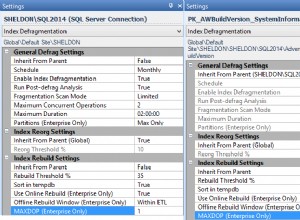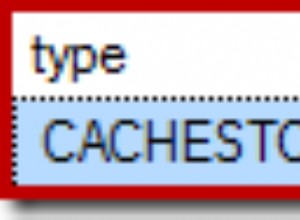Znalazłem dobrą pomoc tutaj
Pamiętaj, że działa to w przypadku zaszyfrowanego tekstu do 65519 znaków w zwykłym tekście. (może trochę więcej, jeśli nie ma kodowania UTF-8)
Kod PHP do zaszyfrowania:
// MySQL uses 16 bytes key for 128 encryption/decryption
$key = "ABCDEF0123456789";
$plaintext = "This string was AES-128 / EBC / ZeroBytePadding encrypted.";
// Optionally UTF-8 encode
$plaintext_utf8 = utf8_encode($plaintext);
// Find out what's your padding
$pad_len = 16 - (strlen($plaintext_utf8) % 16);
// Padd your text
$plaintext_utf8 = str_pad($plaintext_utf8, (16 * (floor(strlen($plaintext_utf8) / 16) + 1)), chr($pad_len));
// Encryption
mt_srand();
$td = mcrypt_module_open(MCRYPT_RIJNDAEL_128, '', MCRYPT_MODE_ECB, '');
mcrypt_generic_init($td, $key, false);
// Generates a warning about empty IV but it's Ok
$ciphertext = mcrypt_generic($td, $plaintext_utf8);
mcrypt_generic_deinit($td);
$ciphertext = mysql_real_escape_string($ciphertext);
// Store in MySQL
$mysqli = new mysqli("localhost", "test", "test", "test");
$mysqli->set_charset("utf8");
$mysqli->query("insert into test(content) value ('$ciphertext')");
$mysqli->close();
Zapytanie SQL do wyszukania string was :
SELECT CAST(AES_DECRYPT(content,'ABCDEF0123456789') AS CHAR) AS content
FROM test
WHERE CAST(AES_DECRYPT(content,'ABCDEF0123456789') AS CHAR) like '%string was%';
Dane wyjściowe to:
This string was AES-128 / EBC / ZeroBytePadding encrypted.
Uwaga:Tabela MySQL została utworzona przez:
create table test (
id int(11) NOT NULL AUTO_INCREMENT PRIMARY KEY,
content blob ) ENGINE=InnoDB DEFAULT CHARSET=utf8 COLLATE=utf8_unicode_ci;




